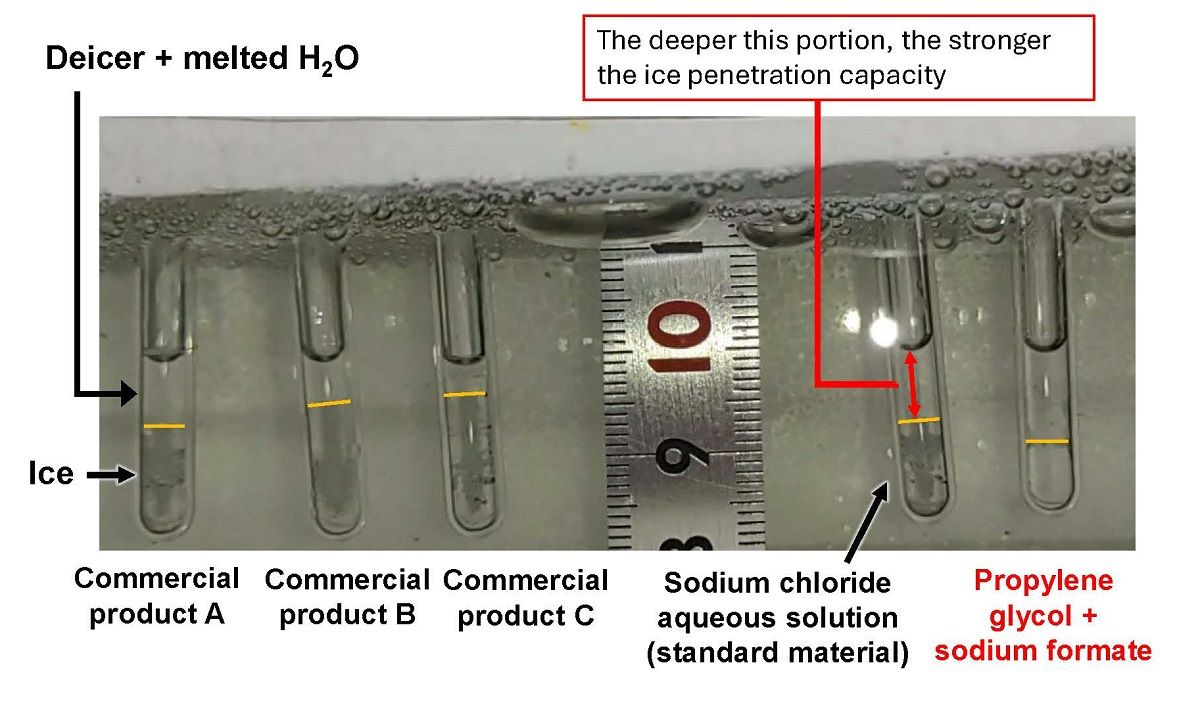Research News
Jun 7, 2024
- Engineering
Frozen? Let it melt with efficient new deicer friendly to the environment
Machine learning helps find advantageous combination of salts and organic solvents

Measuring ice penetration capacity
The experiment compared several commercial deicers with an aqueous sodium chloride solution as the control and a new propylene glycol-sodium formate mixture.
Credit: Osaka Metropolitan University
The dangers of frozen roads, airplane engines, and runways are well known, but the use of commercial deicers often means short-term safety over long-term environmental degradation. Seeking a better product, Osaka Metropolitan University researchers have developed a deicing mixture offering higher performance than deicers on the market while also having less impact on the environment.
The team, made up of graduate student Kai Ito, Assistant Professor Arisa Fukatsu, Associate Professor Kenji Okada, and Professor Masahide Takahashi of the Graduate School of Engineering, used machine learning to analyze ice melting mechanisms of aqueous solutions of 21 salts and 16 organic solvents. The group then conducted experiments to find that a mixture of propylene glycol and aqueous sodium formate solution showed the best ice penetration capacity.
Because of the mixture’s effectiveness, less of the substance needs to be used, thereby also lessening the environmental impact. It is also not corrosive, preventing damage, for example, when used for airport runways.
“We are proposing an effective and environmentally friendly deicer that combines the advantages of salts and organic solvents,” exclaimed Dr. Fukatsu.
The results of this research, published in Scientific Reports on June 7, 2024, also provide new insights into the ice melting process.
“The development of highly efficient deicers is expected to make deicing and anti-icing operations easier,” Professor Takahashi added. “This will also lessen the environmental impact by reducing the amount of deicer used.”
Funding
This work was partially supported by a grant-in-aid from the Ministry of Education, Culture, Sports, Science, and Technology (MEXT), administrated by the Japan Society for the Promotion of Science (JSPS) (JSPS KAKENHI Grant Numbers JP20H00401 and JP22K14492). Additional support was provided by the Izumi Science and Technology Foundation, the Kansai Research Foundation for Technology Promotion, and the Nippon Sheet Glass Foundation for Materials Science and Engineering.
Paper Information
Journal: Scientific Reports
Title: Machine learning-assisted chemical design of highly efficient deicers
DOI: 10.1038/s41598-024-62942-y
Author: Kai Ito, Arisa Fukatsu, Kenji Okada, and Masahide Takahashi
Published: 7 June 2024
https://www.nature.com/articles/s41598-024-62942-y
https://doi.org/10.1038/s41598-024-62942-y
Contact
Graduate School of Engineering
Email: fukatsu[at]omu.ac.jp
*Please change [at] to @.
SDGs
